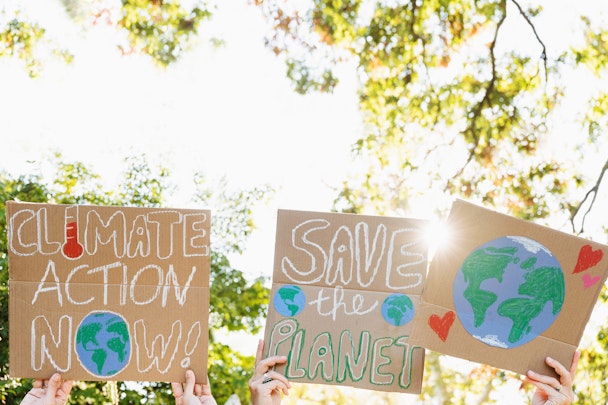Are we really letting fear of backlash prevent climate action?
Don’t let the fear of backlash result in ‘greenhushing’, writes Michelle Arrazcaeta and Georgia Craib, strategy directors at 180 Thinking.

Backlash is an opportunity to get feedback and increase accountability, say experts / Adobe Stock
Businesses know action is necessary when it comes to their sustainable undertakings. Whether it’s addressing the productions they run, the products they create, or even the way their offices are heated. But sharing these actions in an uninformed way can lead to the hot topic of corporate greenwashing.
“Making claims ratchets up people’s expectations, expectations lead to greater scrutiny, that scrutiny can lead to a kind of gotcha phenomenon.” - World Economic Forum.
The response to this is an emerging behavior where brands are “going green then going dark,” according to South Pole, a climate action consultancy. The pendulum is swinging in the opposite direction from one dangerous behavior, overpromising and greenwashing, to silence and greenhushing.
Advertisement
Silence hampers progress
Actions are mandatory for change but words are important too. Communicating actions is bigger than positive PR and an uplift in the bottom line. It’s actually about the ripple effect. Communicating pushes other corporations to level up. It encourages friendly competition, models what’s possible and how to do it. Need more reasons?
-
It raises the standards for that category
-
It encourages other leaders in any category to try
-
It creates the opportunity to collaborate and innovate on things like supply chain decarbonization, in and outside the category
-
It demonstrates a business’s integrity to its consumers and the planet we live on
-
It respects the reality that we’re all in this together
But, even if this rings true, it may feel challenging to implement because of potential backlash. We, alongside our clients, are conscious of this reality as we realize our own sustainable ambitions. However, some reframing can go a long way. Here’s our take on how to shift thinking and beliefs to navigate this space differently.
Advertisement
Backlash isn’t the end of the world (seriously)
Backlash is a negative response from activists or consumers to empty promises, weak actions, or uninformed communications (unintentional or intentional greenwashing). That seems rational. Let’s not catastrophize backlash when it’s often just a fair comeback to shadiness.
Furthermore, backlash also contains expert feedback. Activists have advanced knowledge of sustainable practices and policies. They are up-to-date on research and meaningful action. Thank goodness! They hold all of us accountable (even President Biden) and push for bolder actions.
Businesses have long been fearful of advocates and interest groups because they’re tough and bold. But they are meant to push corporations to do better, like when Greenpeace pushed Nestlé in 2018 to have higher standards and clearer goals. That’s their role in paradigm shifts, in creating lasting change. Sure, sometimes they use fear tactics to ruffle feathers and get attention but that may be because they don’t have a seat at the table.
So, is it really that bad to be challenged to do better?
What if corporations collaborated with activists early on and avoided backlash altogether?
Suggested newsletters for you
Make it about iteration, not perfection
There are brands who fear ‘backlash’ but communicate their positive impact anyway. Not only do they encounter ‘fair comebacks’ and survive, but they also use feedback as a tool for learning, inspiration and even community engagement.
A great example was Ace & Tate’s press release, ‘Look, we fucked up’. They acknowledged they’d set an ambitious goal without doing all the research and publicly shared the lessons they learned. Another example is the small business Tales by Trees sharing how they responded, with an open mind, to consumers who didn’t understand their ‘net positive’ model and accused them of greenwashing.
Think of it like launching a piece of software. When new software hits the market, it’s often in the beta phase, allowing users to test, learn and find the problems that need fixing. This helps companies learn and tweak as they go. We think sustainability efforts should be treated more like this; like beta software that can be iterated on.
So, do we really need to get it right every time?
What if corporations shared failures and learnings so we all learn and progress faster?
Sustainability: when you win, everyone wins
Historically, when it comes to helping one another grow, corporations haven’t always been team players.
Holding onto and protecting information is the standard to benefit from innovations, and IP, and to increase the bottom line. When it comes to sustainability, sharing openly about things like supply chain innovation benefits us all. The more we try, the more we learn. The more we share, the faster we can implement change and the less money we invest in mistakes.
We share the burden, we share the benefits. We – corporations, consumers, and society – all win. When organizations defer silencing, they prioritize themselves. They prioritize their brand’s health over the planet’s health. And people will notice that.
So how are we approaching sustainability right now? For our bottom line or for the planet?
What if we asked what we can do for sustainability rather than what sustainability can do for our business?
When the fear of greenwashing comes up, instead of going quiet, consider what you’re actually afraid of. Challenge how you are seeing the world. This is a collective fight. Change can’t be made alone or by staying silent.
By choosing to act differently, and talk openly about it, you start a ripple effect and begin to create the world as it could be. Your business, and the planet, will thank you.
Michelle Arrazcaeta and Georgia Craib are strategy directors at 180 Thinking.
